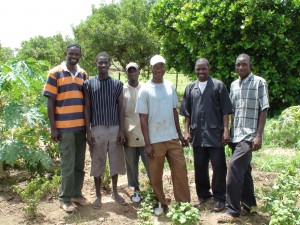
Despite the fact that the number of hungry people worldwide is nearly 1 billion people, funding for agricultural development has been steadily declining. Much of the funding that does exist is directed towards ‘one-size-fits-all’ innovations that are often expensive and inaccessible to those most in need. But for the millions of farmers in sub-Saharan Africa, dependent on their small-scale farms to feed their families and bring in an income, there are a multitude of inexpensive and relatively easy steps that they could take to improve their harvest yields and their livelihoods.
Even more important than coming up with new agricultural innovations, is getting information about the agricultural innovations that work to the farmers that need them. What farmers in Africa might need turns out to be much closer to what we’ve come to enjoy in our homes every day.
In Africa, much like here in the rest of the world, people depend on the radio. Though cell phones, computers, and televisions might seem like more obvious—and increasingly popular—forms of mass communication, the radio is still the least expensive and most widespread communications technology in most homes. And many of the people listening to the radio in Africa are farmers.
Through its project, Africa Farm Radio Research Initiative (AFRRI), Farm Radio International is testing the viability of using radio as a tool for spreading valuable agricultural information to farmers. With over 300 broadcasters in 39 African countries, Farm Radio International‘s programs reach an audience of over 600 million people speaking more than 300 languages.
In Mali, where the soil is often dry and eroded, for example, AFRRI is working with local leaders and extension officers to present radio programs that can help farmers improve soil quality. Radio Fanaka Fana and Radio Jigiya, two local partner stations with a combined audience of over 170,000 people, present regular shows promoting the use of compost pits to create organic fertilizer.
Farmers were certainly listening. In one region alone where the program was broadcasted, households practicing improved composting increased from just over 25 percent to over 89 percent. Farmers reported feeling more comfortable with local extension officers after hearing them on the radio, and—based on word of mouth— other communities outside the reach of the radio stations started requesting programs of their own. One outside community even built a homemade antenna so they could hear the programs being broadcast in the next region over.
The benefit of the improved composting practices came in loud and clear to the listening farmers. It was just a matter of finding the right channel through which to share that information. As funders, policy makers and governments look for ways, in the coming months and years, to alleviate hunger and poverty, we hope that they look no further than the simple tools already available and trusted by farmers in Africa, like their local radio station.
Programs like ARFFI are looking to what the farmers want to hear and giving it to them, providing not only another quality program to tune into on the radio, but valuable information that is improving yields, incomes, and livelihoods all across the continent of Africa. Additionally, local newspapers regularly pick up these stories to include in print.
Farmers are listening and reading too.
Molly Theobald is a research fellow with Nourishing the Planet.

Danielle Nierenberg, an expert on livestock and sustainability, currently serves as Project Director of State of World 2011 for the Worldwatch Institute, a Washington, DC-based environmental think tank. Her knowledge of factory farming and its global spread and sustainable agriculture has been cited widely in the New York Times Magazine, the International Herald Tribune, the Washington Post, and
other publications.
Danielle worked for two years as a Peace Corps volunteer in the Dominican Republic. She is currently traveling across Africa looking at innovations that are working to alleviate hunger and poverty and blogging everyday at Worldwatch Institute’s Nourishing the Planet. She has a regular column with the Mail & Guardian, the Kansas City Star, and the Huffington Post and her writing was been featured in newspapers across Africa including the Cape Town Argus, the Zambia Daily Mail, Coast Week (Kenya), and other African publications. She holds an M.S. in agriculture, food, and environment from Tufts University and a B.A. in environmental policy from Monmouth College.








